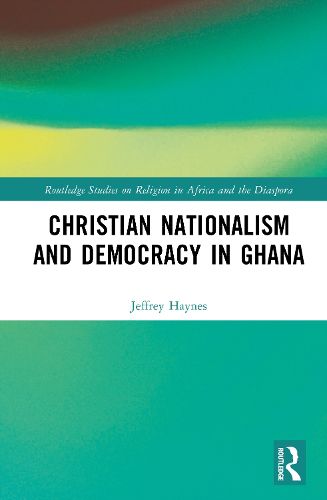Readings Newsletter
Become a Readings Member to make your shopping experience even easier.
Sign in or sign up for free!
You’re not far away from qualifying for FREE standard shipping within Australia
You’ve qualified for FREE standard shipping within Australia
The cart is loading…






This book investigates the impact of Christian nationalism on democracy in Ghana, arguing that proponents of a specific Christian worldview seek to remake the country according to their values and beliefs.
Christian nationalism is a significant religious and political ideology in several African countries, not only Ghana, but also Zambia and Nigeria. In Ghana, prominent Christian nationalists, encouraged by sections of the American Christian Right, cultivate political influence with powerful political elites and by developing a high media profile to promote their views and increase their numbers of followers. The book examines specific examples of Christian nationalism's impact on Ghana's democracy: the national cathedral as a symbol of national unity and social cohesion, anti-Muslim pronouncements threatening inter-faith harmony, and attacks on Ghana's LGBTQ+ community. Overall, the book argues that Christian nationalism is a specific threat to Ghana's three decade-long liberal democracy, with the aim of undermining the constitutional equality and human rights of some Ghanaians in favour of a specific Christian worldview.
This book will be of interest to researchers of religion and politics in Africa, with Ghana serving as an important case study for those interested in the regional impact of Christian nationalism.
$9.00 standard shipping within Australia
FREE standard shipping within Australia for orders over $100.00
Express & International shipping calculated at checkout
This book investigates the impact of Christian nationalism on democracy in Ghana, arguing that proponents of a specific Christian worldview seek to remake the country according to their values and beliefs.
Christian nationalism is a significant religious and political ideology in several African countries, not only Ghana, but also Zambia and Nigeria. In Ghana, prominent Christian nationalists, encouraged by sections of the American Christian Right, cultivate political influence with powerful political elites and by developing a high media profile to promote their views and increase their numbers of followers. The book examines specific examples of Christian nationalism's impact on Ghana's democracy: the national cathedral as a symbol of national unity and social cohesion, anti-Muslim pronouncements threatening inter-faith harmony, and attacks on Ghana's LGBTQ+ community. Overall, the book argues that Christian nationalism is a specific threat to Ghana's three decade-long liberal democracy, with the aim of undermining the constitutional equality and human rights of some Ghanaians in favour of a specific Christian worldview.
This book will be of interest to researchers of religion and politics in Africa, with Ghana serving as an important case study for those interested in the regional impact of Christian nationalism.